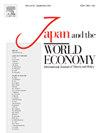Foreign exchange liberalization and exchange rate exposure: Firm-level evidence of the Japanese Automobile Industry
IF 1.2
4区 经济学
Q3 ECONOMICS
引用次数: 0
Abstract
This paper empirically examines the effect of the drastic amendment of the Foreign Exchange and Foreign Trade Act (FEFTA) in 1998 on the exchange rate exposure of ten Japanese automobile firms. By conducting panel estimation using the firm-level explanatory variables constructed originally, we find that (1) the degree of automobile firms’ exchange rate exposure increased significantly during the post-1998 FEFTA amendment period; (2) however, more profitable automobile firms with higher ROE and facing larger exchange rate volatility could reduce their exposures after the 1998 FEFTA amendment because they could conduct efficient operational hedging through expanding supply chains and more readily utilize efficient hedging instruments to reduce group-wide foreign exchange risk; (3) more sales in and exports to Southeast Asian countries significantly reduced automobile firms’ exposures, because they tended to invoice their exports to Southeast Asian countries not in USD but in the yen. Our findings would be insightful for Asian economies that move gradually toward foreign exchange liberalization. Efficient operational and financial hedging, as well as invoice currency choice, significantly affect the degree of exposure after foreign exchange liberalization.
外汇自由化与汇率风险:日本汽车工业的企业层面证据
本文实证考察了1998年《外汇及对外贸易法》的大幅修订对10家日本汽车企业汇率风险敞口的影响。利用最初构建的企业层面解释变量进行面板估计,我们发现(1)1998年后自由贸易协定修订期间,汽车企业的汇率风险敞口程度显著增加;(2)然而,利润较高、净资产收益率较高、汇率波动较大的汽车企业在1998年FEFTA修订后可以减少其风险敞口,因为它们可以通过扩大供应链进行有效的运营对冲,更容易利用有效的对冲工具来降低集团范围内的外汇风险;(3)对东南亚国家的销售和出口增加显著降低了汽车企业的风险敞口,因为汽车企业倾向于以日元而不是美元开具对东南亚国家的出口发票。我们的研究结果将对逐渐走向外汇自由化的亚洲经济体具有深刻的见解。有效的操作和财务对冲以及发票货币选择显著影响外汇自由化后的风险敞口程度。
本文章由计算机程序翻译,如有差异,请以英文原文为准。
求助全文
约1分钟内获得全文
求助全文
来源期刊

Japan and the World Economy
ECONOMICS-
CiteScore
2.60
自引率
0.00%
发文量
26
审稿时长
46 days
期刊介绍:
The increase in Japan share of international trade and financial transactions has had a major impact on the world economy in general and on the U.S. economy in particular. The new economic interdependence between Japan and its trading partners created a variety of problems and so raised many issues that require further study. Japan and the World Economy will publish original research in economics, finance, managerial sciences, and marketing that express these concerns.
 求助内容:
求助内容: 应助结果提醒方式:
应助结果提醒方式:


